Energy-efficiency and Huge China Market Keep Eco-Lighting Makers Busy
2009/04/03 | By Ken LiuAs governments worldwide execute economic stimulus programs to combat the global downturn, the outlook for eco-friendly lighting that cuts carbon emissions and saves electricity significantly looks bright due to heavy investments in public works projects.
Many in Taiwan, including major enterprises, are making moves to engage in or already manufacturing energy-saving lighting as cold cathode fluorescent lamp (CCFL) and high intensity discharge (HID) lamp as well as light emitting diode (LED).
Taiwanese lighting manufacturers say that China has an estimated market potential of eight million streetlights a year, adding that the mainland's central government has been demanding, since 2007, local governments to save a quarter of electricity used every year. LED streetlighting, therefore, has become their top choice due to their 40% better power efficiency than traditional cousins. In 2008, the mainland's State Council rushed out 10 projects to boost domestic demand, planning to spend a total of four trillion yuan (US$588 billion at US$1:6.8 yuan) by the end of 2010. Half of the budget will go to infrastructural projects including streetlight installations. This year alone, around 2.5 million streetlights are planned to be installed in China.
Even Taiwan budgets NT$130 million (US$3.7 million) to install around 3,000 LED streetlights islandwide. Industry watchers estimate Taiwan had 1.4 million streetlights last year, with LED lamps accounting for less than 1%. In 2007 alone, around 2,000-3,000 LED streetlights were installed islandwide.
The online market clearinghouse LEDInside says that Taiwan's streetlight market has an estimated value of NT$40-50 billion (US$1.1-1.4 billion at US$1:NT$35) if traditional lights were replaced with LED types.
The market researcher Topology Research Institute of Taiwan points out that many Taiwanese LED manufacturers are partnering with mainland Chinese packagers, system suppliers, traffic-light suppliers and streetlight suppliers to tap the vast mainland market of LED streetlights, with the Taiwanese manufacturers including Epistar Corp., I-Chiun Precision Industry Co., Ltd., Lite-On Technology Corp., Everlight Electronics Co., Ltd., and Bright Led Electronics Co., Ltd. The major Hon Hai Group is speeding its foray into the LED streetlight market through acquisitions that help build its integrated capability in LED manufacturing.
Foxsemicon Integrated Technology
Specializing in LED-streetlight module R&D, manufacturing and marketing, Foxsemicon Integrated Technology Inc. of the Hon Hai Group has become an all-round manufacturer of LED lighting. The company has won many patents on LED lens applied to streetlights, enabling it to overcome glare in LED lamps.

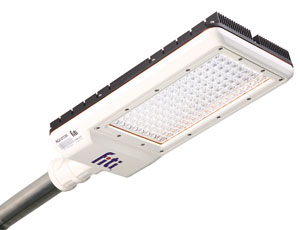
After buying into Foxsemicon, Hon Hai acquired a 46.6% stake in lens maker Ability Opto-Electronics Co., Ltd. for around NT$840 million (US$24 million) through its subsidiaries. Now, the group is reportedly looking to buy an epitaxy-wafer maker to complete its LED empire.
Delta Electronics
Power-supplier maker Delta Electronics Co., Ltd. has also jumped on the bandwagon, recently unveiling 14-LED lighting fixtures including a solar LED streetlight, a high-efficient streetlight and a patented full-range-stepless phase-dimming fixture. The company's vice president, R.Y. Hsu, says all these lighting fixtures, mostly aimed at public-work projects, will be volume produced the next quarter.

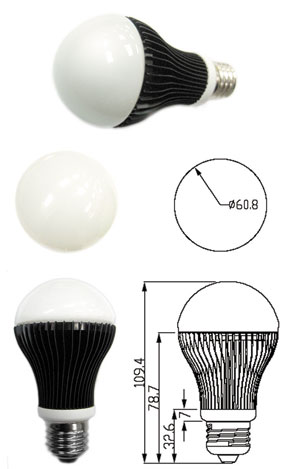
Delta's senior executives suggest Epistar is the company's deployment in the chip-making sector. Industry watchers predict Delta would buy stakes in Epistar.
One of Delta's lines is the SLDT family of LED streetlights, featuring modular design for easy maintenance and repair. These lights are eight meter high and adopt natural heat-dissipation design. Its closed light-source design makes it non-interchangeable with non-SLDN streetlights.
Delta's solar LED streetlights are equipped with its own solar panels and are suitable for road lighting in remote places, featuring photo-sensitive switch that powers on and off according to the ambient lighting level.
The firm also makes LED indoor lighting fixtures primarily developed for offices and households, including T-bar ceiling lighting fixture, T8 lamps, and E27 lamps. All of them feature traditional lighting-fixture specifications to allow replacement without retrofitting.
Jenn Group
Founded in 1976, the power-tool maker Jenn Group began branching out into the LED lighting sector in 2007, introducing the 4W MR16 lamp, 12W PAR30 lamp, 18W PAR38 lamp, 13W downlight, 60W wind-powered streetlight, and 35W as well as 85W spotlights.
Although the group is known for its power-tool manufacturing, it has many advantages in LED lighting manufacturing as it started in auto-lamp manufacturing and had diversified into manufacturing of ballasts for HID lamps before getting involved in LED-lighting manufacturing.
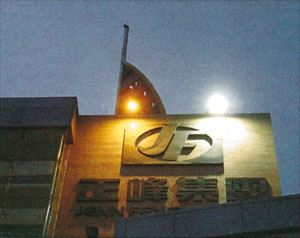
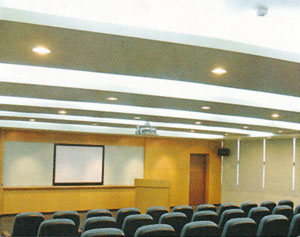
The sales director says Jenn Feng's LED business targets commercial applications and its product lines are divided into lamp and lighting-fixture categories. "Our market is LED replacements for halogen and quartz lamps, and our lighting fixtures are mostly installed as road and tunnel lighting," Peng says, adding that KTO's streetlights are already installed in Taiwan and have been shipped to the United States and mainland China.
Ready-made Distribution
Having a ready-made distribution channel is the group's other advantage for its LED business. Peng says that the group has set up a complete distribution network locally and overseas for its power tools, which also works for its LED lighting products. "We contract hardware stores in Taiwan and distribute our tools through Wal-Mart and K-Mart in the United States," Peng notes. Several years ago, the group acquired the U.S. toolmaker McCulloch and has since set up business ties with big U.S. retailers.
KTO has also contracted several lighting-engineering companies to sell its products, while the company has three franchised distributors in Canada.
To ensure product reliability, KTO adopts LED packages supplied by Everlight, Intematix Technology Center, and Seoul Semiconductor Co., Ltd. and has worked with Dr. C.C. Sun, an optical-science professor at the National Central University of Taiwan, on LED-lighting technologies.
Peng stresses that the group's green-energy business emphasizes developing solar panels and wind turbines as well as LED lighting. The group set up the division several years ago in anticipation of the promising renewable-energy market. "We'll be moving toward combining renewable energies with LED lighting," Peng says. The group aims to elevate green-energy sales to generate half of its revenues over next few years.
AHA LED
Founded in Hong Kong in 2007, AHA LED has been targeting public-works projects as its major market for LED lighting products. In October last year, the company opened a flagship store in Taipei, after which it has introduced various LED outdoor lamps, including a 1080W special-purpose light, a 350W tower light for airports, as well as a 180W, a 136W and a 120W roadway lights.
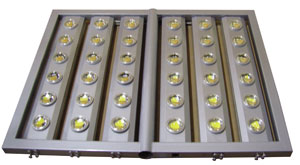
To avoid infringing patents, AHA LED has unveiled a proprietary multi-chip packaging technology, which reportedly boosts the luminosity of its LED lighting fixtures by over 93%. Using mature manufacturing technology has reduced production costs while raising its flawless rate to over 97%.
Even Sunon Group
The Even Sunon Group, said to be the world's No.1 thermal-fan maker, has gotten into the LED lighting act by introducing a unique thermal fan specifically designed for LED lamps rated 10W to 25W. The fan module features a patented "blocking ring" in its inlet to stop hot air from reflowing into LED lamps after extraction. Also, the ring controls and increases airflow speed, with field test proving the fan effectively cools by 10 centigrade as compared with traditional fans. Also, the company uses the "MagLev Motor" to cut noise by 17dBA relative to traditional fans.
The fan also has a unique dual-directional rotational design, with a patented loop allowing the fan to rotate clockwise initially after power-on to dust off LED lamps, and the fan turns after a few seconds counterclockwise to cool the lamp, which enhances lifespan of a lamp.
The company offers customized service and scalable designs as necessary, the company's executive stresses.
TYC Brothers Ind.
The auto-lamp maker TYC Brother Industrial Co., Ltd., reportedly Taiwan's No.1 supplier of aftermarket lamps for vehicles, has recently introduced its first HID streetlight targeting public-works projects. Company chairman J.J. Wu claims his company is Taiwan's first streetlight maker to introduce the ceramic metal halide type HID lamp.
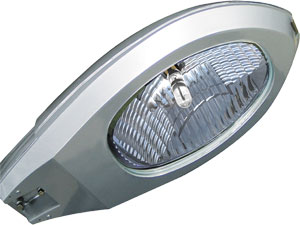
"Our HID lamps achieve over-60% energy saving and reflection efficiency as high as 80% thanks to the leading-edge ceramic metal halide light source and our specialized lens technology," Wu boasts.
Wu estimates that Taiwan could save as much as 1.4 billion kilowatt-hour of electricity costing NT$1.4 billion (US$41 million) a year by installing the company's HID streetlights islandwide, helping to cut carbon emissions by as much as 900,000 metric tons a year to save around NT$10 billion (US$294 million) to manage such emissions based on the per-metric-ton cost of US$350.
To effectively get ready for the potential big volume of business in energy-saving lighting, the company has taken many steps, including opening a dedicated lighting division, entering into alliance with a high-tech company owned by the Tongji University of Shanghai, and planning to open factories in Shanghai to make HID streetlights for the vast mainland market. Wu predicts that HID sales to account for at least 10% of TYC's revenues in five years.




